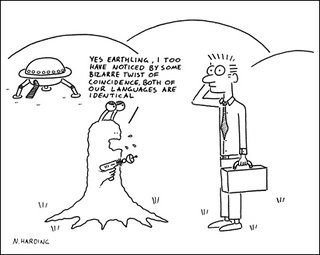Secrets of the Silver Screen: The Trouble with Coincidence
 Scenario 1: Bugs Bunny is hanging around in the forest and runs into Elmer Fudd. It's the first day of Rabbit Season.
Scenario 1: Bugs Bunny is hanging around in the forest and runs into Elmer Fudd. It's the first day of Rabbit Season.Scenario 2: Harry Potter dons his invisibility cloak, takes about ten steps in any given direction, then hears someone whispering about whatever it is he needs to know.
Scenario 3: Luke, I am your father.
Scenario 4: Sharon and Susan meet and instantly dislike each other at summer camp. Though they look exactly alike, save the style of their hair, they don't realize until much later that they're IDENTICAL TWINS SEPARATED AT BIRTH!
Scenario 5: The Home Alone kid was mistakenly separated from his family and left to fend for himself a second time.
Scenario 6: A young child who convinced you he was your reincarnated husband was kidding all along, having stumbled upon a box of old letters that enabled him to effectively mimic your former spouse's memories and mannerisms.
I don't know about you, but I can swallow scenarios 1 and 2, because we're talking about Bugs and Harry, c'mon. I can buy scenario 3 because that particular coincidence also marked a killer-good shocker in the epic trilogy (it will always be a trilogy to me). I can even buy scenario 4, because The Parent Trap is an old classic Disney film, and an irritational part of me says, "they didn't know better back then." Some people might be able to buy scenario 5, but I couldn't bring myself to see Home Alone 2. And Scenario 6 (Birth, in case anyone is wondering where that plot came from) was completely rejected by the world-at-large.
What makes coincidence okay in some cases and not in others?
Whenever you rely on the coincidence crutch you are choosing to decrease the authenticity of your story. This isn't a big deal when you're talking about things the audience doesn't believe in anyway--like Bugs, Harry Potter, interplanetary warfare and anything Disney. When you're telling a funny story, like Home Alone or Parent Trap, you have some leeway as well. Again, no one's looking for authenticity; they're looking for laughs.
But when you're telling a dramatic, true-to-life story--especially one for adults-- the authenticity aspect of your work needs to be as highly developed as it can be, or you risk losing your audience's respect, attention and the emotional investment they've made in the tale. Truth is, to rely on contrivation in dramatic stories is to embrace lazy storytelling. Take the time to ensure all plot points--ESPECIALLY the black moment and/or the crucial reveal--make good clear sense and have no whacked explanations. Don't know for sure if your plot rings true? Ask a writing buddy.
In the end, your manuscript will stand stronger without the crutch of coincidence.

 posted by Therese Walsh at
posted by Therese Walsh at 


0 Comments:
Post a Comment
<< Home